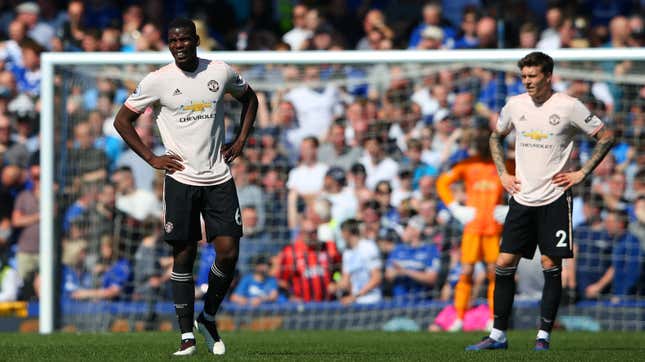
At various points this season, Manchester United have been dying, dead, buried, on the way back, back again, and lost in the wilderness. It’s fitting, then, that on Easter Sunday, United finally reached its lowest point of the season: a 4-0 loss to Everton, United’s worst defeat to the Toffees in club history.
It’s not just that United walked into Goodison Park and got clobbered. The wonderful, maddening thing about soccer is that truly anyone can beat anyone else on a given day, even by a historic score. The worrying thing is that United look as lost and overmatched as they ever did under José Mourinho, at a time when the team seemed like it had finally moved beyond that.
Take the second goal on Sunday, when Nemanja Matić decided the smartest thing to do against Gylfi Sigurðsson, a slow dribbler with a powerful shot, is to back ten yards off and let him rip a laser past David de Gea:
In fairness to de Gea, who has had an awful season, three of the four goals on Sunday were damn near unstoppable. For instance, you can’t blame de Gea for this perfect left-footed volley through traffic by full back Lucas Digne:
United have been shaky defensively all season, though, even during the midseason turnaround. (They have now given up 48 goals in league play, already the most ever conceded by a United side in the Premier League.) With the sorry defensive personnel the team has to rely on, tactics can only do so much to paper over those massive cracks. So what’s arguably more concerning than the goals United allowed to Everton are the chances they didn’t create for themselves.
Despite giving up a goal just 13 minutes into the game, United took only seven total shots all day, compared to Everton’s 15. The Red Devils managed only a single shot on target all match, and it didn’t come until the 86th minute. These are appalling figures for any team, and even more so for a team with United’s array of talented attackers.
An attack built around Romelu Lukaku, Paul Pogba, Anthony Martial, and Marcus Rashford should not find it so difficult to create chances. It looked like Ole Gunnar Solskjær had addressed the attacking woes of the Mourinho era by loosening the reins some, but the fix hasn’t stuck. The first half of Solskjær’s tenure was marked by lots of goals and fun and freedom and winning. But since Solskjær’s crowning achievement—the comeback victory over PSG to advance to the Champions League quarterfinals—the team has looked sluggish, constrained, impotent in front of goal, and defeated. In the eight matches since the PSG comeback, United have won only once, haven’t kept a single clean sheet, and have scored more than a single goal in a match twice.
The problem isn’t Solskjær, just like the problem wasn’t really Mourinho before. United’s fundamental issue is that the roster just isn’t that good. From striker to defense, United have gaping holes that must be addressed if the team is ever to recapture its former glory for more than just a month or two.
Even the most optimistic United fans must believe that the team needs to revamp at least half of the starting XI. Their defense is the most dire; in an ideal world, the club would begin next season with an entirely new starting back line. Midfield is a little brighter, but not much. Aside from Paul Pogba—who is by no means a problem, though he might become one should he decide to leave this summer rather than slum it in the Europa League again—and the rapidly improving Scott McTominay, no midfielder’s spot in the lineup or even at the club should be taken for granted. In attack, it’s feeling more and more like Lukaku isn’t quite cut out for the starting center forward spot, and at least one and maybe even two starting-quality wide forwards would be welcome so that United aren’t so reliant on the still green pair of Rashford and Martial.
United will rise again—that’s not really in doubt. Because of how European soccer is set up, unending amounts of money in the bank will almost always buy you a spot in the elite sooner or later. What Solskjær and executive vice-chairman Ed Woodward need to do is to stop whiffing when they do open up the checkbook. United have spent more than almost every other club in Europe since Sir Alex Ferguson stepped down in 2013, and they have very little to show for it. The club’s long list of high-priced flops (Ángel Di María, Memphis Depay, Juan Mata, Alexis Sánchez, Lukaku, Fred, Henrikh Mkhitaryan) is truly what’s kept the most popular club in the world down for half a decade. United’s only salvation lies in reversing that trend.
Solskjær almost certainly isn’t the best man for the job of returning United to greatness, and he might not even be capable of doing it at all. However, barring some last-minute play for Mauricio Pochettino, it is Solskjær who will sit in the manager’s chair during United’s next transfer window. What he and United do in the market will matter more than a 4-0 loss to the Toffees in April, and that—more than the roller coaster of a season United has had—will be what sets the path for the club going forward.